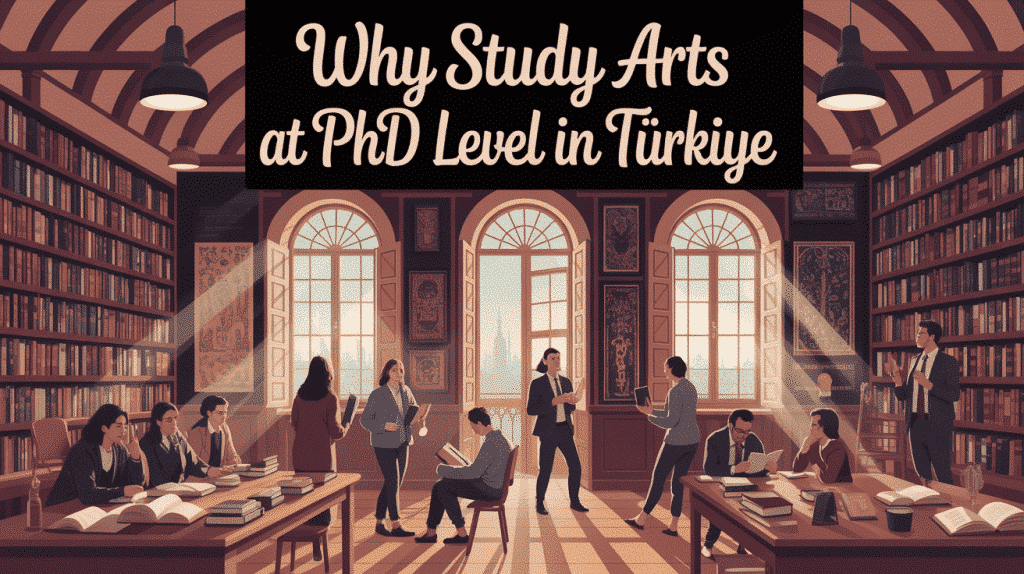Why Study Arts at PhD Level in Turkiye
Research Opportunities
Cultural Advantages
Practical Information
Career Prospects
Academic Excellence and Program Diversity
Turkiye offers a variety of PhD programs specifically in Arts, Design, and Architecture at its top universities. Institutions such as Istanbul Bilgi University and Aydin University are recognized for their robust academic frameworks that cater to a diverse range of specializations, including Visual Arts. This diverse academic portfolio provides students with comprehensive research opportunities to explore their interests thoroughly.
Key Aspects of Academic Offerings:
- Commitment to Research Excellence: Turkish universities emphasize the importance of original research, aiming to produce innovative dissertations that contribute to the field of arts.
- Theoretical and Practical Focus: The doctoral curriculum balances theoretical frameworks with practical applications, developing well-rounded arts researchers and practitioners.
- Multidisciplinary Approach: Programs often draw inspiration from cultural history, creative practices, literary imagination, and social critique, allowing students to cultivate unique artistic perspectives.
Research Opportunities
PhD programs in Turkiye prioritize original research and scholarly output, preparing students to undertake inventive dissertations. The nation’s rich historical and cultural heritage provides a remarkable backdrop for arts research, creating unique contexts not found elsewhere.
Benefits of Research in Turkiye:
- International Collaborations: Turkish universities maintain strong ties with global arts institutions, enabling doctoral students to engage with international artistic communities.
- Cultural Context: The synergy of traditional artistic heritage and contemporary creative practices enriches the research environment, pushing the boundaries of innovative studies.
Example Programs:
- Visual Arts: Explore complex narratives surrounding contemporary and traditional visual arts, facilitated by universities like Antalya Bilim University.
- Design Studies: Engage with modern design challenges within the cultural context of Turkiye, providing rich material for your PhD dissertation.
Cultural Advantages
Turkiye’s position as a bridge between East and West creates a unique cultural landscape ideal for arts researchers. Its artistic heritage spans thousands of years and multiple civilizations, providing direct access to historical artistic developments.
Highlights of Cultural Immersion:
- Historical and Modern Juxtaposition: Cities like Istanbul offer vibrant contemporary art scenes alongside their rich historical treasures, allowing for fashionable and deeply rooted artistic exploration.
- Cultural Accessibility: Engaging in Turkiye’s festivals, galleries, and museums can provide PhD candidates with exceptional research conditions and practical insights into the arts.
Practical Information
The typical duration for a PhD in Arts in Turkiye is approximately 33 months, with flexible options for full-time and part-time study available.
Key Practical Points:
- Blended and Distance Learning: Many programs offer blended or distance learning formats, presenting a flexible study path for international students.
- English-Taught Programs: These programs are widely available, enabling access for non-Turkish speakers.
- Support Services: Universities provide comprehensive services tailored to international PhD students, including accommodation assistance and social integration programs.
Career Prospects
A PhD in Arts from a Turkish university equips graduates with specialized knowledge and research skills that are highly valued both in academic and professional settings globally.
Potential Career Paths:
- University Teaching: Many graduates pursue careers in academia, contributing to educational institutions worldwide.
- Museum Curation and Arts Administration: Others may find roles in curating exhibitions or managing arts organizations.
- Cultural Policy Development: Graduates often engage in shaping cultural policy within governmental or non-profit sectors.
- Independent Artistic Practice: Many artists choose to continue their creative pursuits, supported by their academic training.
The growing creative industries in Turkiye also provide opportunities for graduates to bridge academic research with practical applications, making an impact in various commercial contexts.
Take the Next Step with Study in Turkiye
If you are interested in embarking on this transformative journey, feel free to contact us to discuss your options or explore partnership opportunities with Study in Turkiye. For further resources, you can check our guides on why to study in Turkiye and the admission process.

